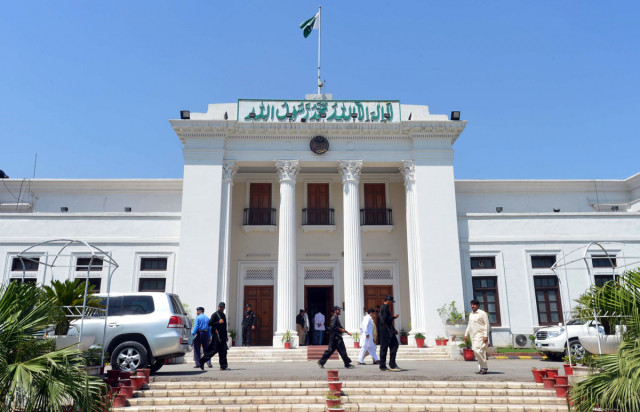Year in review: Treasuring the seats of power
Govt spends most of the seven assembly sessions trying to wrinkle out internal differences.

Throughout the year, the treasury benches in the Khyber-Pakhtunkhwa (K-P) Assembly not only made frequent attempts to settle differences among themselves but also had an active opposition to pacify.
Seven sessions were convened during 2014. Of these, three were called by the opposition benches whereas four were convened by treasury benches. Moreover, a total of 63 sittings were completed in the house.

On August 19, opposition members submitted a no-confidence motion against Chief Minister Pervez Khattak. The decision was taken to thwart the possible dissolution of the assembly following Pakistan Tehreek-e-Insaf (PTI)’s Azadi march in Islamabad. However, the motion was quietly withdrawn on October 21. K-P Assembly Speaker Asad Qaiser was asked to convince the joint opposition to withdraw its no-trust motion against Khattak after a meeting with Jamaat-e-Islami chief Sirajul Haq.
Nevertheless, the opposition continued to mount pressure on the government till the provincial budget was released. However, with time, their efforts in this regard steadily began to lose ground.
The first few sessions which the opposition requisitioned this year were held between February 18 and March 6. However, in April and May, opposition benches called two back-to-back sessions. The first of these two sessions was held between April 16 and May 13, while the next took place from May 26 to June 6. A total of three sittings were completed during this period.
This was followed by a relatively short session on the provincial budget from June 14 till June 26 in which a total of nine sittings were completed.

Dry spell
Interestingly, the house did not meet for another four months till end October as the opposition and treasury benches were reluctant to call a session. At this stage, members of the treasury bench already had too much on their plate as they were preoccupied with the sit-ins in Islamabad. However, the opposition also fell silent after submitting the no-trust motion in August.
It is believed that the opposition benches shied away from calling a session as they feared having to proceed with the motion. Moreover, if the motion failed, PTI would have no choice but to proceed with the dissolution of the house.
After a long wait, the house met on October 23. Interestingly, the house appeared to be cutting it close. The session was held a day before the government could have been held liable for infringing Article 54. According to the provision, no more than 120 days shall pass between the last sitting of one session and the date set for the first sitting of the upcoming session.
During 2014, PTI managed to defuse tensions within its ranks after deputy speaker Imtiaz Shahid Qureshi was appointed as law minister. However, it was compelled to terminate the membership of Javed Nasim, one of its lawmakers from Peshawar, for protesting against the chief minister.
Power struggle
The PTI also gained considerable strength after winning a seat in the re-elections in Swat and DI Khan. The former was previously held by the Pakistan Muslim League-Nawaz while the latter was previously held by an independent candidate backed by PTI. Pakistan Peoples Party also increased its electoral strength after winning a seat from Chitral. Meanwhile, Jamiat Ulema-e-Islam-Fazl and PTI lawmakers remained at loggerheads for the most part of the year.
The house is scheduled to meet on January 2. The New Year is likely to commence with a session on the attack on Army Public School.
Published in The Express Tribune, December 31st, 2014.













COMMENTS
Comments are moderated and generally will be posted if they are on-topic and not abusive.
For more information, please see our Comments FAQ